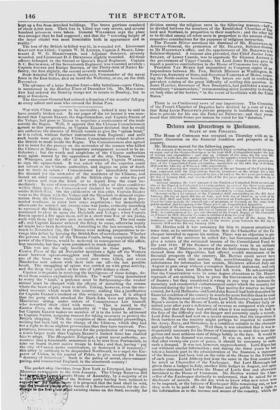War with China appears to be inevitable ; indeed it
may be said to have actually broken out. In our paper of the 1st instant it was men- tioned that Captain ELLIOT, the Superintendent, and Captain Smells of the Volage, had gone to Macao to negotiate a continuance of the trade outside the Bogue. Well, it appears that the Chinese Commissioners agreed to that proposition, as Captain ELLIOT declared that he could not authorize the masters of British vessels to give the "opium bond," as it is called, without further instructions from England ; and until such bonds were given, the Chinese Commissioners refused to allow the British to trade inside the Bogue. The Commissioners also agreed not to insist for the present on the surrender of the seaman who killed the Chinese at Macao. The temporary arrangement seemed to be sa- tisfactory ; but the wrath and suspicions of the Chinese authorities were again roused by the appearance of the ship Thomas Coutts at Whampoa, and the offer of her commander, Captain WARNER, to sign the opium-bond. It was asked why all the captains could not submit to the Chinese authorities, and engage on pain of death not to trade in opium ? Commissioner LIE immediately renewed his demand for the surrender of the murderer of the Chinese, mid issued an edict commanding all the British ships to enter the port of Canton and sign the bond, or to depart from the coast im- mediately. In ease of non-compliance with either of these conditions -within three days, the Commissioner declared he would destroy the entire British fleet. On the publication of this edict, Captain ELLIOT went to the Bogue with the Volage and the Hyacinth to demand expla- nation from the Chinese Admiral Kw_or. That officer at first pre- tended readiness to enter into some negotiation ; but immediately afterwards he ordered out twenty-nine war junks, evidently intending to surround the British ships. They were repeatedly warned off, but continued to close in upon the Hyacinth and Volage ; when Captain Smut opened a fire upon them, and in a short time five or six junks, each with from 120 to 200 men on board, were sunk. The rest made off; and Captain ELLIOT ordered the firing to cease, otherwise nearly all might have been destroyed. According to the last accounts, which reach to November 7th, the Chinese were making preparations to re- venge this defbat by burning the British fleet of merchantmen. Whether the persons on board of the Thomas Coutts, being completely in the power of the Chinese, would be molested in consequence of this affair, was uncertain, but they were considered in much danger.
This was not the only hostile collision in those parts. The Canton Prom of the 2d November mentions a fight off the Western coast between opium-smugglers and Mandarin boats, in which one of the boats was sunk, several men were killed, and seven Mandolins sent ashore with their tails cut off—the last possible insult. The smuggling of opium was carried on with great activity, and the drug was quoted at the rate of 1,000 dollars a chest.
Caution is requisite in receiving the intelligence of these doings, de- rived from sources exclusively British. The " wolf" being determined to worry the " lamb," a pretence must be forthcoming—the weaker animal must be charged with the offence of disturbing the stream where the beast-of prey went to drink. Taking, however, even the one- sided accounts which reach this country, nothing like a justification for Captain ELLIOT'S conduct on this occasion appears. It is alleged that the party which attacked the Black Joke were not pirates, but Mandarins acting under orders of Commissioner LIN himself,
who rewarded their chief with money. This is stated in the Canton Press, on the loose authority of " the linguist Alenzae ; " but Captain EuGior makes no mention of it in the letter he addressed to Captain Smerit, assigning reasons for taking measures to protect the British shipping. With the exception of these doubtful proceedings, nothing has been laid to the charge of the Chinese, which they had Hot a right to do on slighter provocation than they have received. Pre-
parations, however, are in progress for the perpetration of wrong upon a much larger scale than Captain ELLIOT'S limited force has enabled
him to adopt. The Hampshire Telegraph, a great naval authority, an- nounces that a formidable armament is to be sent from Portsmouth, to take on board 16,000 native troops in India ; and that, having " put the city of Canton under contribution, or destroyed it if necessary," this army issuddenly to be despatched Northward, to compel the Em- peror of China, in his capital of Pekin, to give security for future decency of behaviour." Such is the policy of moral, slave-emanci- pating, and commercial England, in the nineteenth century !


























 Previous page
Previous page